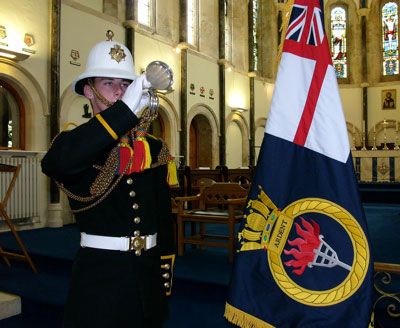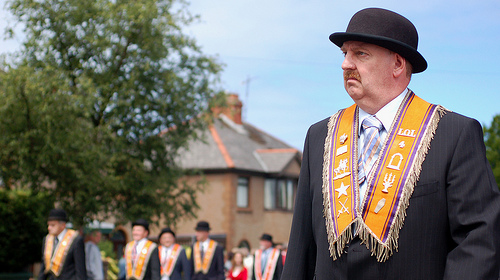| Irish Forums Message Discussion :: Irish and British, Orange and Irish |
   | Irish Forums :: The Irish Message
Forums About Ireland and the Irish Community, For the Irish home and Abroad. Forums include- Irish Music, Irish History, The Irish Diaspora, Irish Culture, Irish Sports, Astrology, Mystic, Irish Ancestry, Genealogy, Irish Travel, Irish Reunited and Craic
|  
|
Irish and British, Orange and Irish


|
|
|
| Irish
Author |
Irish and British, Orange and Irish Sceala Irish Craic Forum Irish Message |
kerrin

Sceala Clann T.D.
Location: Wicklow
|
| Sceala Irish Craic Forum Discussion:
Irish and British, Orange and Irish
|
|
|
Two events this week show how Ireland has changed. The events are remarkable.
From the Indo
Last Post sounds for 'gentle giant' killed in Taliban blast
The funeral cortege makes its way through the town of Westport
By Tom Shiel
A British army bugler sounded the Last Post and Reveille as the coffin of "gentle giant" Robert McKibben was lowered into the grave in Co Mayo yesterday.
On a cold November day, thousands of miles from the Afghanistan battleground where he lost his life in a Taliban attack, the Royal Marine made his final journey through his hometown of Westport.

His coffin was draped in the flag of the Marines as the funeral cortege wound its way through the streets led by his British army comrades.
Robert, killed earlier this month, was in line for promotion when he died, mourners at his funeral Mass were told.
Chief celebrant Fr Terry O'Malley said Marine McKibben, who was his nephew, had been deemed worthy to enter an even more elite unit but instead his death was what his family and friends would have to come to terms with.
McKibben (32), a native of Westport, was killed instantly along with a comrade, Neil Dunstan, when their vehicle was hit by an explosive device in Helmand Province.
A grieving comrade, Warrant Officer Thomas Roberts, told mourners in St Mary's that Robert was "a gentle giant".
Mr Roberts told a hushed congregation: "He used his ample stature to assist never to intimidate."
The chief mourners, who included Robert's parents Grainne and Frank; his brother, Raymond and two sisters, Rachel , Maggie and Carmel, were told that he was a man who always viewed life as a half full glass. He exhibited virtues of patience, humility and forbearance and was an inspiration to all his colleagues, Fr O'Malley said.
Fr O'Malley was joined on the altar by a number of priests including another uncle, Fr. Brendan O'Malley, and Fr. Michael Sharkey, chaplain to the Royal Marines.
At the start of the Mass, Fr. Denis Carney, administrator, Westport, called for prayers for Neil Dunstan and a third colleague who is recovering having been injured.
- Tom Shiel
I understand from Mick that a high percentage of these Irishmen are joining foreign forces because ....they can not get into the Irish military. The Irish military have limited and very strict entrance requirements.
Lance Corporal Ian Keith Malone from Dublin who was killed in the Iraq War, was a member of the British Army's Irish Guards. He was the first Irish death in the conflict.
Twenty-eight year old Ian Malone came from a working class background in the Dublin suburb of Ballyfermot. He served in the FCA, the Irish army equivalent of the territorial army. He applied to join the Irish army permanently, but aged 22 was deemed too old, as the Irish Army at that time was only recruiting seventeen and eighteen year olds. After considering joining the French Foreign Legion, he decided to join the Irish Guards, a regiment of the British Army.
Lance Corporal Malone was one of a number of Irish soldiers in the British Army who were interviewed on a Radio Telifís Éireann documentary series, True Lives. Regarding his membership of the British Army, he said
At the end of the day I am just abroad doing a job. People go on about Irishmen dying for freedom and all that. That's a fair one. They did. But they died to give men like me the freedom to choose what to do.
Lance Corporal Malone was killed after he was shot in the head by a sniper on 6th of April 2003 in Iraq.
RTE
McAleese visits Cavan Orange Hall

President Mary McAleese has visited an Orange Hall in Cavan as part of a series of engagements in the county.
It is the first such visit by an Irish head of state on either side of the border.
The President was expected to be met by senior Orange Order figures from both the north of Ireland and the Republic at Brakey Orange Hall, oustide Bailieborough.
She was also due to inspect Brakey Hall itself which was rebuilt some time ago following an arson attack in which it was badly damaged.
President McAleese will also be carrying out a number of other functions during her Cavan visit.
Replace Either-Or with Both: McAleese
President Mary McAleese's remarks on her landmark visit to Brakey Orange Hall, Bailieborough, Co Cavan.
It was the first visit by an Irish head of state to an Orange hall.
'We live in a time of amazing flux. Some of it makes us anxious, uneasy and uncertain, like the huge changes taking place in the global and local financial markets. Some of it makes us hopeful that past divisions within our communities and on our island can be healed and a new culture emerge which is respectful of the otherness of the other.
There are things happening among us and within us which are impacting in very positive and reassuring ways. We are fortunate to have been witnesses to things that seemed very unlikely just a short time ago. We have seen Ian Paisley sit down as an equal partner in government with Martin McGuinness. We have heard him describe former Taoiseach, Bertie Ahern as his friend. In those events he did more for reconciliation on this island than libraries of PhDs in conflict resolution.
Now Dr Paisley's successor Peter Robinson is carrying on that torch as, along with Martin McGuinness and their colleagues in Government, they deepen that partnership for the betterment of all the people of the north of Ireland. We know they face many challenges but we wish them well for, despite the economic malaise, we can feel a new momentum carrying us all to better, more neighbourly times.
There are signs large and small of new connections, a new spirit of trust and generosity. In Westport earlier this week, we had the extraordinary scenes at the funeral of Robert McKibben, a young local man, killed in service with the British Army as a member of the Royal Marines in Afghanistan. He received a beautifully dignified funeral in his own town in the West of Ireland, his coffin carried by six uniformed colleagues from the Royal Marines and thousands of his townsmen and women there to show their sorrow and respect.
And in this month of November 2008, we mark the 90th Anniversary of the ending of the Great War with commemorations in both parts of the island as we remember the thousands, from both parts of the island and both major traditions, and none, who gave their lives in that terrible slaughter. One of the centrepieces of the acts of remembrance has been a flagship radio series and book jointly produced by the Royal Irish Academy and RTÉ called, poignantly and tellingly, 'Our War', for 200,000 of our people served in that war and almost 50,000 gave their lives.
Here this morning, in the presence of Henry Latimer, a good Cavan man, a good Irish man and a good Orangeman, many of these strands come together. Perhaps here in Brakey Orange Hall this morning it's a good time and place to acknowledge how far we have come in the last 10 years, since the signing of the Good Friday Agreement and to pledge that the journey of peace-building and peace-making will and must continue. We have taken the first important steps towards ending the bitter culture of Either-Or, of Them Versus Us.
Now we must build a new culture of Both, each accepting that there are different perspectives and practices, each patient with the other as we get to know each other better in a growing spirit of understanding and outreach. It is possible to be both Irish and British, possible to be both Orange and Irish. We face into a landscape of new possibilities and understandings. The momentum of these times is, of course, difficult for some and so they lash out in intemperate acts of vandalism that have been visited on some Orange Halls, including Brakey.
Such acts are a throw-back to another time, and we condemn them utterly and unequivocally. The tit-for-tat that is visited on GAA clubs just brings it home to us how utterly wasteful and humanly tragic are these episodes and what a waste of the lives of those who can see no further than such vandalism. I invite them all to stop and think how wonderfully transformed all our lives would be if we were all made as welcome in each other's home as I have been made welcome here.
So I thank you Henry Latimer and your colleagues here in Brakey for welcoming your President this day and allowing me to say in the poignant words of Tom Kettle, a nationalist who was killed in the great War, in his poem 'Cancel the Past',
'Bound, from the toil of hate we may not cease
Free, we are free to be your friend'.
|
|
|
|
|
|
|
|
|
|











